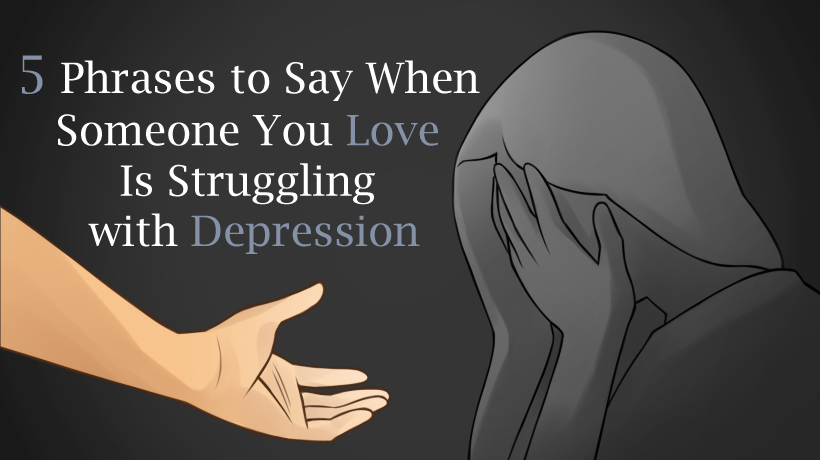If someone you love is struggling with depression, it can be tough to know how to help. With around 16 million adults in the U.S. each year experiencing at least one episode of major depression, it’s safe to say that there’s no “one-size-fits-all” solution to mental illness.
Signs and symptoms of depression, according to Mayo Clinic, can include:
- Expressing feelings of sadness, emptiness, or hopelessness
- Feeling irritable, frustrated, or angry over small things
- Sleeping much more or less than normal
- Having changes in appetite — either eating more or less than normal and gaining or losing a lot of weight
- Having anxiety, restlessness, or agitation
- Having unexplained physical problems, like back pain or headaches
- Difficulty thinking, concentrating, remembering things, and making decisions
- Expressing feelings of guilt or worthlessness, or ruminating on past failures
- Mentioning death or suicidal thoughts.
If someone you care about has been diagnosed with depression or is showing any of these symptoms, knowing how to respond is key. Being afraid of saying the wrong thing might cause you to hold back on offering assistance or encouragement, but it’s better to be there for support above all. While saying the right thing can vary depending on the situation, it’s a good start to look for answers on how to best respond. Here are some helpful ways to communicate if someone you love is struggling with depression.
“I can’t fully understand what you’re going through but I’m here for you no matter what.”
Even if you can’t understand the complexity of your loved one’s depression, it is still important to show them that you are here to support them in their fight for the long haul. We often try to point out the positive aspects of someone’s life to help them deal with depression, but depression isn’t easily fixed with these kinds of reminders. These kinds of efforts, including questioning the source of sadness, often increase the shame people with depression feel for experiencing sadness and invalidate their feelings. The best support is accepting their truth and letting them know that you are there to support them every step of the way.
“If you ever want to talk, I am always here to listen.”
Listening and providing emotional support makes a difference to people dealing with depression because it’s common for them to isolate and withdraw. As mentioned above, don’t try to fix anything when you listen to them — just listen to your loved one with empathy, warmth, and compassion. It’s important not to make this conversation about you, but maintain the focus on them. Although relating other people’s experiences to our own can be a helpful tool in empathizing with one another, it may make the other person feel unheard or misunderstood, explains Emanuel Maidenberg, a clinical professor of psychiatry and the director of the Cognitive Behavioral Therapy Clinic at the Semel Institute for Neuroscience and Human Behavior at UCLA. Because let’s be honest, you don’t really know what’s going on in the other person’s head. Simply listening and offering your support is enough.
Avoid statements like, “I know exactly how you feel right now. I’ve felt depressed, too,” suggests clinical psychologist Rudy Nydegger, chief of psychology at Ellis Hospital and professor at Union College.
“I’m always going to be here to talk, but what do you think of therapy?”
If your loved one is suffering from depression but not receiving any professional help, therapy is always a good way to start. Although friends and family can be great support systems, they cannot fulfill the responsibility of a professional. When making this suggestion, be sure to do so gently and tentatively, not as a demand. If your friend needs help in the search of finding a therapist, offer your assistance. Often times, finding a therapist can be a difficult and overwhelming task, especially for someone with untreated mental illness. Having the help of a trusted friend or family member assist them in their search can sometimes make this task a bit easier, so long as the person in need of help feels comfortable. Be sure to respect their privacy and boundaries while doing so!
“I’m not sure how true this is for you, but in my experience with depression…”
Although it’s important to keep the focus on the other person, that doesn’t necessarily mean you need to remain completely silent about your own mental health. If you’ve struggled with depression or mental illness in the past or present, sometimes letting your loved one know can be comforting and help them feel less alone in their struggles.
“Knowing others have gone through something similar can also help them feel less ashamed or blaming towards themselves for how they’re feeling,” explained New York-based clinical psychologist Allison Ross to Self Magazine.
You can let them know that you feel for them, and based on what they’re saying, it sounds like you may have had a similar experience. If they want to hear more about your experience, they’ll ask you. Otherwise, move the conversation forward.
“I’m going for a walk, do you want to come?”
There are times your loved one may not want to talk about how they’re feeling. In these cases, sometimes just offering companionship can provide just as much comfort. If they don’t feel up to it, don’t push it any further.
Sources:
https://www.self.com/story/what-to-say-to-someone-with-depression
https://www.everydayhealth.com/depression-pictures/ways-to-help-loved-one-with-depression.aspx#just-listenhttps://www.mayoclinic.org/diseases-conditions/depression/in-depth/depression/art-20045943
This article was updated and edited by Maya Pontone on June 8, 2021.



